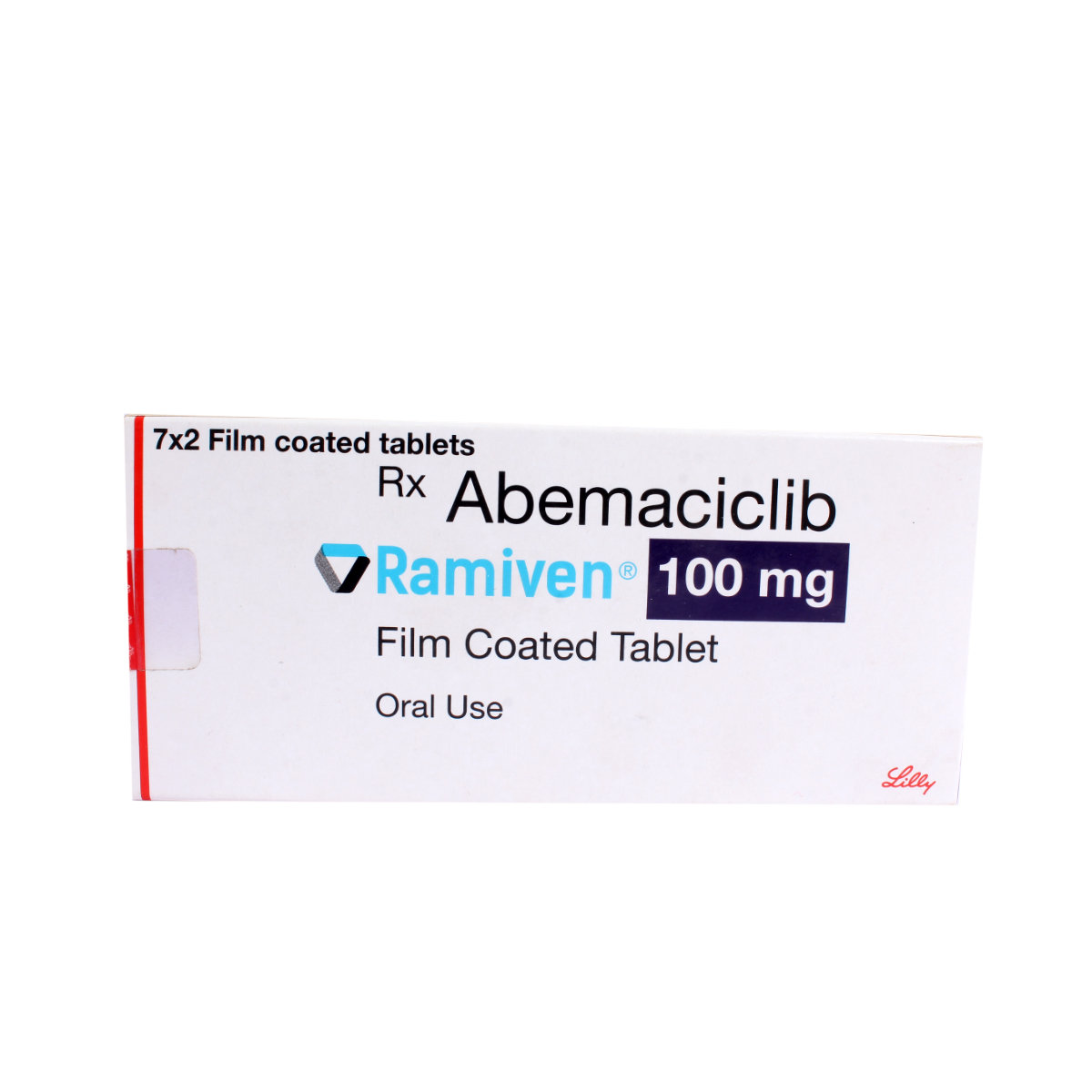Abemaciclib
About Abemaciclib
Abemaciclib belongs to the group of anti-cancer drugs called kinase inhibitors used alone or in combination with other anti-cancer drugs to treat certain types of breast cancer. Breast cancer is a type of cancer that develops in the breast when the breast cells begin to grow abnormally.
Abemaciclib contains Abemaciclib which works by blocking cyclin-dependent kinase 4 and 6 proteins, which are necessary for the growth and division of the cells. Thereby, slows down the growth of cancer cells and delays the progression of cancer.
Take Abemaciclib in the dose and duration prescribed by your doctor. Abemaciclib may cause certain common side effects such as nausea, diarrhoea, abdominal pain, and fatigue. Most of these side effects do not require medical attention and will resolve gradually over time. However, you are advised to talk to your doctor if these side effects persist.
Avoid taking Abemaciclib if you are pregnant or breastfeeding. Abemaciclib may cause dizziness, so drive only if you are alert. Abemaciclib should not be given to children as safety and effectiveness have not been established. Avoid consuming alcohol along with Abemaciclib as it could lead to increased dizziness. Inform your doctor about your health condition and medications before taking Abemaciclib to rule out any side effects.
Uses of Abemaciclib
Medicinal Benefits
Abemaciclib is an anti-cancer drug used in the treatment of certain types of breast cancers. Abemaciclib is used either independently or in conjunction with other chemotherapy medications. Abemaciclib works by inhibiting cyclin-dependent kinase 4 and 6 (CDK) which are responsible for the uncontrolled growth and proliferation of cancer cells. By inhibiting these, Abemaciclib helps prevent the progression of the disease, nips the spread and shrinks the tumour tissue.
Directions for Use
- Take Abemaciclib with or without food as advised by the doctor.
- Usually, it is to be taken twice daily, or as directed by your doctor.
- Swallow Abemaciclib as a whole with a glass of water.
- Do not crush, chew, or break it.
Storage
Side Effects of Abemaciclib
- Nausea
- Vomiting
- Tiredness
- Abdominal pain
- Decreased appetite
- Headache
Drug Warnings
Do not take Abemaciclib if you are allergic to any of its contents. Talk to your doctor before taking Abemaciclib if you have liver problems, heart/heart rhythm disorders, blood clot issues, or kidney problems. Avoid taking Abemaciclib if you are pregnant or breastfeeding. Abemaciclib may cause dizziness, so drive only if you are alert. Abemaciclib should not be given to children as safety has not been established. Avoid consuming alcohol along with Abemaciclib as it could lead to increased dizziness. Inform your doctor about your health condition and medications before taking Abemaciclib to rule out any side effects.
Drug Interactions
Drug-Drug Interactions: Abemaciclib may interact with antibiotics (clarithromycin, erythromycin), antifungals (ketoconazole, itraconazole), analgesics, diuretics, blood-thinners (dabigatran etexilate), heart medication (digitoxin), anti-epileptics (phenytoin, carbamazepine), antivirals (ritonavir, lopinavir) or anti-depressants (St John’s wort).
Drug-Food Interactions: Avoid grapefruit, and its juice while on treatment with Abemaciclib as it might increase the amount of Abemaciclib in blood.
Drug-Disease Interactions: Abemaciclib should be used with caution in patients with a known hypersensitivity disorder, HIV, epilepsy, kidney disease, liver disease, thromboembolism, lung or breathing disorders, heart disease or inflammatory bowel disorders that cause diarrhoea.
Drug-Drug Interactions Checker List:
Safety Advice

Alcohol
unsafeIt is not recommended to consume alcohol with Abemaciclib. Please consult your doctor if you have any concerns.

Pregnancy
unsafeAbemaciclib is not recommended during pregnancy. Please consult your doctor in case of any concerns.

Breast Feeding
cautionAbemaciclib is not recommended during breastfeeding. Please consult your doctor in case of any concerns.

Driving
cautionAbemaciclib may cause dizziness and tiredness, which may affect your ability to drive. Do not drive if you experience any side effects after using Abemaciclib.

Liver
unsafeAbemaciclib should be avoided in case of established liver disease. Please consult your doctor to address any concerns.

Kidney
cautionExercise caution before using Abemaciclib in case of established kidney disease. Please consult your doctor to address any concerns.

Children
unsafeAbemaciclib is not recommended for use in children as the safety and effectiveness have not been established. Please consult your doctor in case of any concerns.
Habit Forming
Diet & Lifestyle Advise
- Eat a healthy diet and exercise regularly to maintain proper weight.
- Avoid smoking and alcohol consumption.
- Include leafy vegetables, citrus fruits, fatty fish, berries, yoghurt, apples, peaches, cauliflower, cabbage, broccoli, beans, herbs and spices in your diet.
- Avoid fast food, fried food, processed meats, refined carbs and added sugar.
- Get optimal sleep; rest well.
Special Advise
- Women of child-bearing age should use effective contraception during treatment with Abemaciclib and for 3weeks after the last dose of Abemaciclib.
- Avoid breastfeeding during treatment with Abemaciclib and for 3weeks after the last dose of Abemaciclib.
- Regular monitoring of white blood cell count and liver function before and during treatment with Abemaciclib is advised.
- Abemaciclib may cause serious blood clots. Inform your doctor immediately if you experience symptoms of blood clots such as pain, swelling in the arms or legs, rapid breathing, rapid heart rate, chest pain, and shortness of breath.
- Avoid taking ketoconazole (anti-fungal medication) while on treatment with Abemaciclib.
Patients Concern
Disease/Condition Glossary
Breast cancer: It is a type of cancer that develops in the breast when the breast cells begin to grow abnormally. Breast cancer may form in lobules (glands that produce milk), ducts of the breast (the pathway that brings milk from glands to the nipple), in the fatty tissue or the fibrous connective tissue within the breast. The tumour cells invade other healthy breast cells and can travel to lymph nodes which are a primary pathway for the cancer cells to move to other parts of the body. Symptoms of breast cancer include a lump in the breast or tissue thickening which feels different than the normal surrounding tissues, breast pain, redness, swelling, nipple discharge other than breast milk, bloody discharge, unexplained change in shape, size or appearance of the breast, peeling, flaking or scaling of the skin, and a lump or swelling under the arm.
FAQs
Abemaciclib belongs to the group of anti-cancer drugs called kinase inhibitors used alone or in combination with other anti-cancer drugs to treat certain types of breast cancer.
Abemaciclib works by inhibiting CDK 4 and 6, which are proteins that cause uncontrolled growth of cancer cells.
Abemaciclib might cause fertility problems in males and may affect your ability to father a child. Talk to your doctor if you have any concerns regarding this.
Do not stop taking Abemaciclib on your own. You are advised to take Abemaciclib for as long as your doctor has prescribed it for you, depending on your medical condition. Do not be reluctant to speak with your doctor if you experience any difficulty while taking Abemaciclib.
Diarrhoea is a common side effect of Abemaciclib which sometimes might be severe. Consult your doctor if you experience diarrhoea while on treatment with Abemaciclib, your doctor might reduce the dose or ask you to stop taking Abemaciclib temporarily.
Abemaciclib might cause neutropenia (low blood cell count). Regular monitoring of white blood cell count before and during treatment with Abemaciclib is advised.
Avoid taking ketoconazole (anti-fungal medication) while on treatment with Abemaciclib. Also, avoid grapefruit, and its juice while on treatment with Abemaciclib as it might increase the amount of Abemaciclib in blood.





